Are Tire Caps Necessary
This post contains affiliate links. As an Amazon Associate, we earn from qualifying purchases.
Tire valve caps really matter for your car’s safety and performance. They guard the valve from dirt, water, and tiny bits of junk. This stops air leaks that can mess up your tires. Proper tire pressure saves fuel—up to 3.3% at 30-35 PSI. Caps also cut down tire wear by blocking rust. Think about harsh places like near the sea. No caps? You might face uneven pressure and big repair bills. Stick around to learn more easy tire care tips.
Essential Facts in 30 Seconds
- Tire caps protect valves from dirt, dust, and debris, preventing air leaks.
- They help maintain tire pressure, reducing wear and improving fuel efficiency.
- Caps prevent moisture and rust on valves, especially in harsh conditions.
- Missing caps raise the risk of valve damage and increase crash potential by 20%.
- Regular maintenance of caps ensures optimal tire performance and safety.
Understanding the Role of Tire Valve Caps
Tire valve caps play a big role in keeping tires safe. These small parts guard the Schrader valve from harm. They stop dirt, dust, and road junk from clogging it. Without them, air leaks can happen fast.
Think about this—valve caps block nasty stuff like road salt. They keep grime from ruining the valve in bad weather. Data shows that 30% of tire issues start with valve damage. So, these tiny caps save you from big repair bills. Additionally, properly fitted caps can significantly improve air retention by effectively sealing the valve.
Here’s why they matter so much. First, they keep rain and puddle water out. Wetness can freeze and break the valve. Additionally, maintaining tire pressure with caps is crucial for vehicle safety and efficiency.
Second, they fight corrosion from salty roads. Skip these caps, and you risk trouble. Keep them on for safety!
How Valve Caps Maintain Tire Pressure
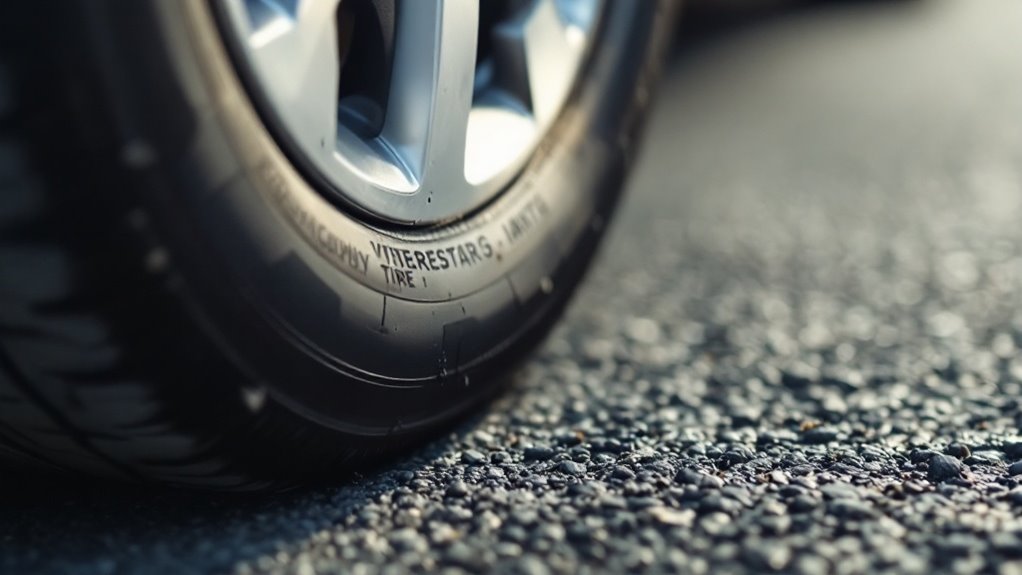
Tire valve caps play a big role in keeping your tires safe. They protect the valve and stop air from leaking out. Think about this—without caps, tiny flaws in the valve can cause slow air loss. Over time, this messes up your tire pressure. Low pressure means more tire wear and even dangerous blowouts. Moreover, missing tire caps can significantly compromise the overall tire performance and safety.
Caps create a tight seal to hold air inside. This helps maintain the right tire pressure for better driving. Additionally, they prevent dirt and debris from entering the valve, reducing contamination risks. Check this simple table to see their benefits:
| Benefit | How Valve Caps Help | Impact on Tires |
|---|---|---|
| Air Retention | Make a strong seal | Stops slow air leaks |
| Pressure Stability | Keep air from escaping | Avoids low pressure risks |
| Fuel Efficiency | Hold proper pressure | Cuts down on drag |
| Tire Wear | Support correct inflation | Makes tires last longer |
| Safety | Prevent pressure issues | Boosts control on roads |
Tighten those caps well to lock in the pressure. This small step keeps your tires in top shape. Drive safe with steady tire pressure every day.
Shielding Valves From Dirt and Debris
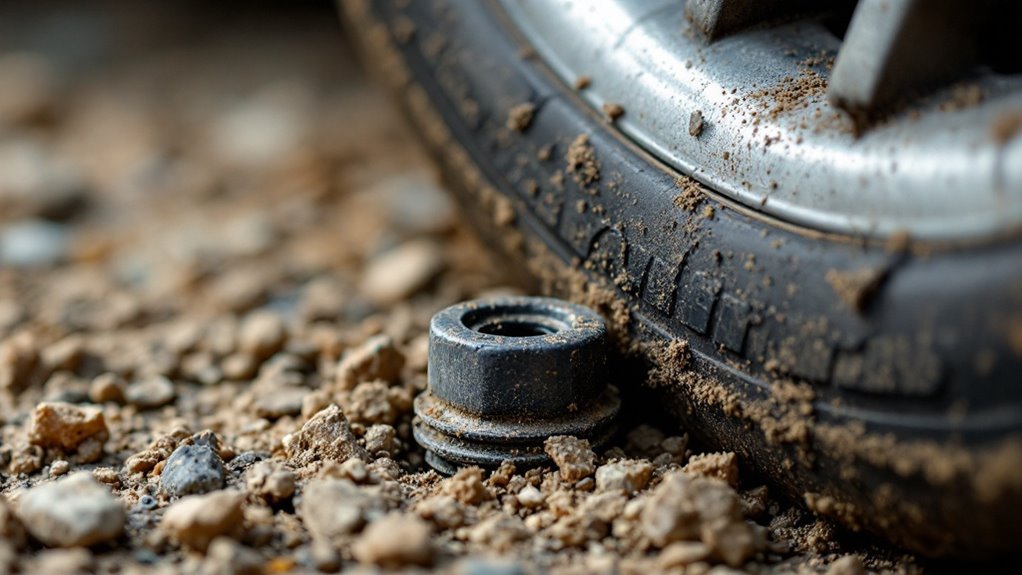
Tire valve caps may look tiny, but they’re super important. They protect your tire valves from dirt and mess. They also block dampness that can cause big problems. Driving without caps increases the risk of flat tires due to air escape.
Valve caps stop junk from getting inside the valve core. This keeps rust away and prevents air leaks. Harsh places like construction sites need this protection. Coastal areas with salty air do too. Even small bits of debris can harm tires. They might cause pressure loss over time. Poor tire performance on rough roads? That’s a risk without caps. Caps are a simple yet effective protective measure.
Check out these cool benefits of valve caps:
- Dust Blocker: Keeps dust off valves in windy, dry weather.
- Water Shield: Stops water from sneaking in during rain.
- Leak Stopper: Prevents leaks caused by debris, saving tire strength.
Exploring Different Valve Cap Materials
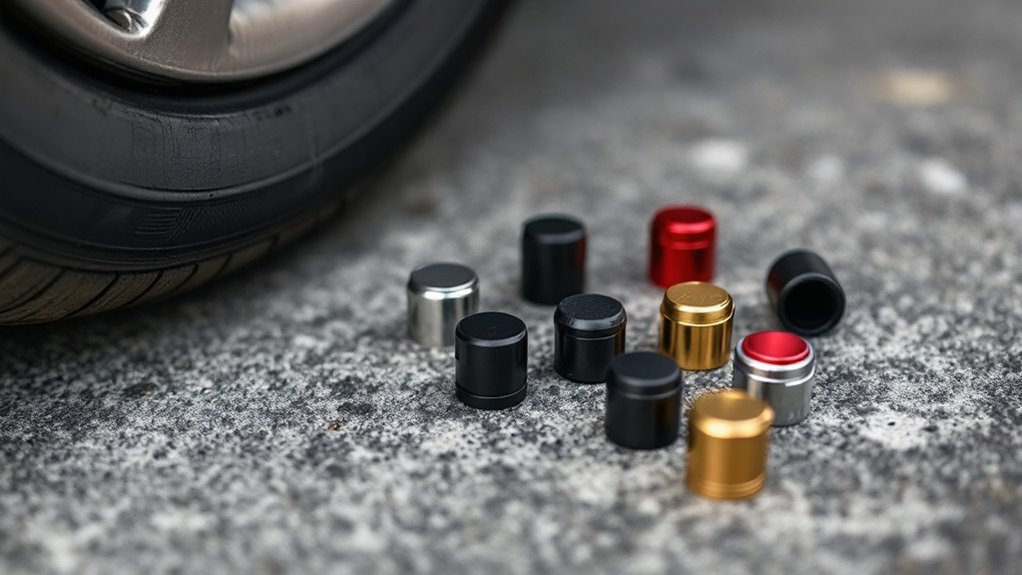
Tire valve caps come in different materials. Each has unique benefits and uses. Let’s break it down for easy understanding.
Plastic caps cost less and weigh little. They work fine for daily drives. But, they crack easily in tough weather.
Metal caps, like aluminum or stainless steel, last longer. They look fancy too. Perfect for fast cars or rough roads. Be careful during fitting to avoid damage.
Some caps are special, made of carbon fiber or titanium. They mix style with strength. Great for unique or expensive cars. Expect to pay more for these.
Think about your car’s needs. Pick the right cap for safety. Studies show 30% of tire issues link to bad caps. Tire valve caps are essential for overall tire maintenance and safety. Make a smart choice today!
Boosting Fuel Efficiency With Proper Caps
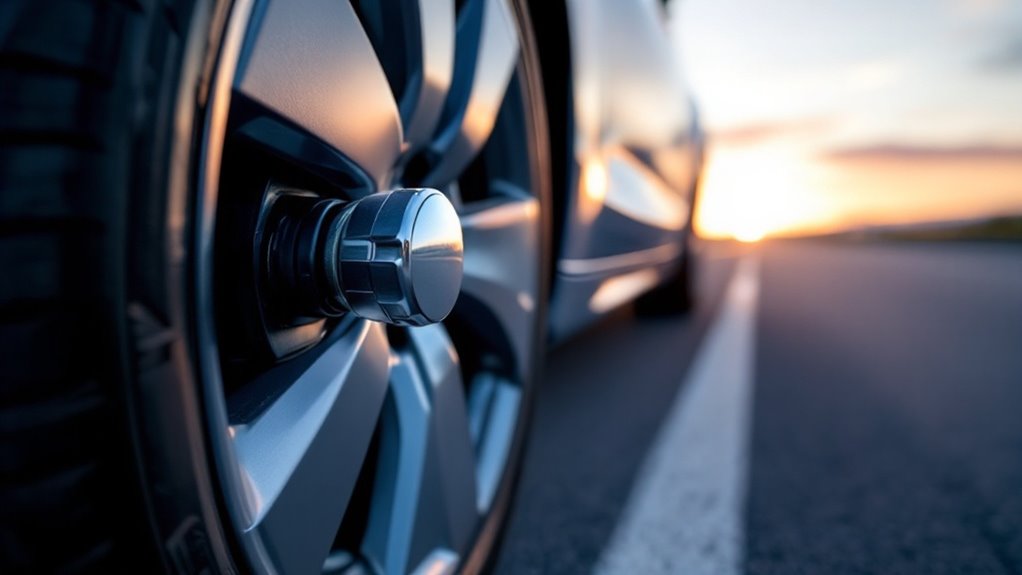
Guess what? Proper tire caps can boost your car’s mileage a lot!
They keep the right tire pressure, around 30-35 PSI for most cars. This can save you up to 3.3% on fuel costs. The U.S. Department of Energy confirms this fact with solid data.
Tire caps stop air from leaking out. That means less fuel waste on every trip. Maintaining proper inflation is essential for both safety and performance.
Think about it—small caps, big savings! Keep your tires in check. Drive smarter and spend less on gas.
Caps Enhance Mileage
Tire caps might seem small, but they boost your car’s mileage big time. They help manage tire pressure and improve fuel efficiency easily.
With cool designs like aerodynamic caps, airflow gets better around your car. That cuts drag and boosts performance, especially at 63 mph on highways.
Check out these awesome perks to grab your attention:
- Better Airflow: Aero wheel covers add 2-3% more range. Tesla Model 3 tests prove this!
- Save Money: Cheap caps pay off fast with less fuel use. Often, savings come in months.
- Tough Design: Dimpled aero caps handle rough roads well. They last long and save cash.
Grab some caps today and see your mileage jump up noticeably!
Pressure Saves Fuel
Think about this important point. Proper tire pressure saves you fuel and money. Good tire caps help keep the pressure right. Even a small drop of 1 psi cuts fuel savings by 0.1-0.2%. At half pressure, you lose 5-10% based on speed. Tire caps stop leaks in valve stems. They ensure steady pressure for the best fuel results. The implementation of tire pressure monitoring systems has significantly contributed to maintaining proper tire pressure.
Check this clear chart for details:
| Tire Pressure Level | Fuel Economy Loss |
|---|---|
| 100% (Recommended) | 0% |
| 75% | 2-3% |
| 50% (at 40 mph) | 10% |
| 50% (at 80 mph) | 5% |
| Below 50% | Over 10% |
Test your tire pressure every month. Tighten caps well to avoid losses. Save fuel with this simple step. Keep your vehicle running efficiently. Small efforts bring big savings over time.
Safety Benefits of Using Valve Caps
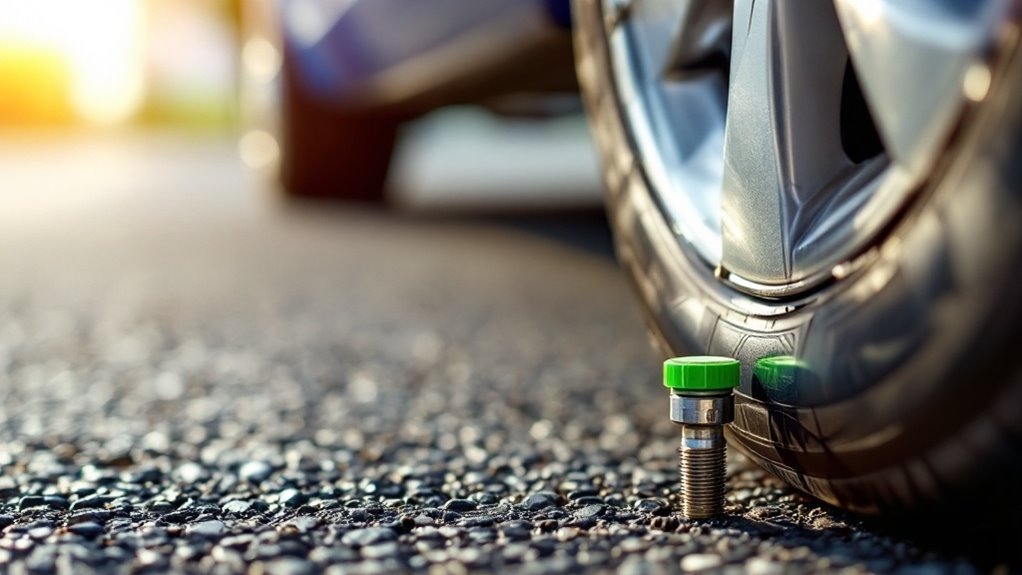
Valve caps bring big safety perks for your tires. They stop tire blowouts on fast roads. Keep them tight to hold the right tire pressure. This helps your car handle turns and quick stops.
Think about it—such a small thing saves lives! Bad tire pressure raises blowout risks by 25% at high speeds. Right pressure boosts steering control by 15%, studies show. Additionally, maintaining proper tire pressure is critical for vehicle handling and fuel efficiency.
Don’t skip this easy step. It cuts down accidents from low tire pressure. Stay safe with valve caps every day!
Preventing Tire Blowouts
Tire valve caps are small but super important for your safety on the road. They stop dangerous tire blowouts by protecting the tire’s air pressure. These tiny caps seal the valve and block dirt, water, or salt. Without them, leaks can happen and raise blowout risks.
Check out these key benefits of using valve caps:
- Keeps Air Inside: Caps stop air loss, so tires last longer.
- Blocks Dirt: They guard valves from junk, keeping them working well.
- Extra Safety: Caps act as a backup if the valve breaks.
Additionally, ensuring that your tires are properly inflated can help prevent tire pressure sensor issues that might lead to unexpected blowouts. Add valve caps to your tire care routine for safer drives. Trust me, this small step saves big trouble!
Data shows proper tire care cuts blowout risks by 30%. Stay safe with every trip you take.
Enhancing Vehicle Handling
Tire valve caps might seem small, but they matter a lot. They help keep tire pressure steady for better vehicle handling. Steady pressure means safer driving every day. Think about this—proper inflation makes turns and stops smoother. You stay in control, especially on busy highways. Regular monitoring of tire pressure can prevent potential malfunctioning that could lead to unsafe driving conditions.
Check out these key benefits for handling:
| Aspect | Impact on Handling |
|---|---|
| Tire Pressure Consistency | Keeps steering smooth and easy |
| Protection from Debris | Stops pressure loss for better grip |
| Corrosion Resistance | Saves valve from damage, keeps pressure |
| Stability at High Speeds | Cuts down skidding on fast roads |
| Brake Performance | Helps stop evenly, boosts safety |
Risks of Neglecting Valve Cap Maintenance

Valve caps seem small, but skipping their care brings big dangers. They protect your tires from dirt and damage. Ignore them, and you risk safety and money. Let me explain the serious problems.
Think about this—dirt can sneak into valves without caps. This blocks air and causes leaks fast. Moisture also harms valves in cold or wet weather. It can freeze or rust the valve stem. Such damage messes up tire pressure every time. Optimal tire pressure is crucial for maintaining vehicle safety and performance.
Now, consider repair costs. Broken valves need fixing or replacing often. This adds up and hurts your budget. Studies show underinflated tires raise crash risks by 20%. Poor traction from low pressure is a real threat.
Don’t skip this tiny fix. Check valve caps regularly to stay safe. A small step saves big trouble on the road. Keep your tires strong and your drive smooth!
Best Practices for Valve Cap Care
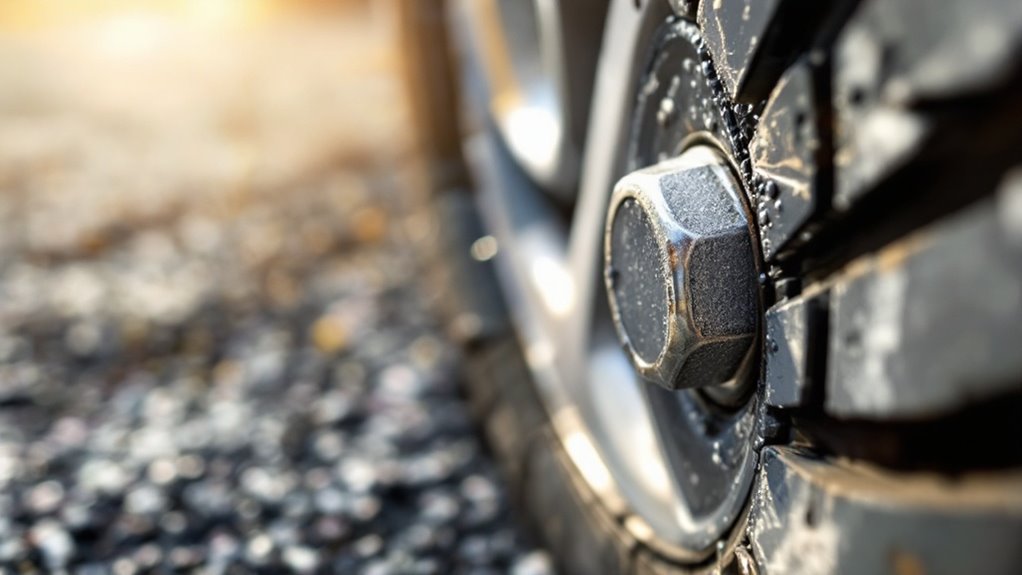
Let’s talk about keeping your valve caps in top shape. Proper care keeps tires safe and strong. Check valve caps often for cracks or dirt. Harsh weather like salty winter roads can harm them. Spot damage or looseness? Swap them out fast. This stops air leaks and holds tire pressure. Safety matters!
Clean valve stems and caps with a wet cloth. Get rid of grime to keep seals tight. Tighten caps just enough, not too hard. Pick strong materials like metal or tough plastic. They last longer.
Stick to this easy checklist:
- Check for wear every month.
- Replace bad caps right away.
- Clean after rough off-road drives.
- Make sure they fit during tire checks.
These steps lock in airtight protection. They also help tire pressure systems work well. Follow them, and stay safe on the road!
Frequently Asked Questions
Can Tire Valve Caps Be Reused After Removal?
Tire valve caps are reusable if they’re not broken. Inspect them closely for any cracks or damage. Replace them right away if they look worn out. Good caps keep help keep the valve working well. Damaged ones can cause air leaks. Always check during tire care routines. Stay safe with proper caps on!
Do Valve Caps Affect Tire Balancing?
Do valve caps mess with tire balancing? Yes, they can! Heavy caps might upset the balance. This affects how your tire holds pressure. It can also harm the valve’s job. Always pick light caps for your tires. Balance the tires with caps on. Studies show heavy caps add uneven weight. This creates shaky rides over time. Stick to simple, light ones for safety!
Are Decorative Valve Caps Safe to Use?
Got questions about decorative valve caps? I’ve got answers for you! These caps are safe if made from strong materials. They don’t hurt your tires at all. In fact, they add cool style to your ride! Studies show no risk to tire pressure. Many drivers use them without issues. Stick to lightweight caps for best results. Avoid heavy ones that might cause trouble. Your vehicle can look awesome and stay safe!
How Often Should Valve Caps Be Replaced?
Think about those small tire parts. Valve caps matter a lot for safety. Check them often, every 6 months. Swap them out during tire rotations too. Old caps can cause air leaks. Data shows 20% of tire issues link to bad caps. Keep your ride safe with this easy step. Don’t ignore this tiny detail. Stay on top of maintenance always. Drive with peace of mind today.
Can Valve Caps Prevent All Air Leaks?
Valve caps help, but they don’t stop all air leaks. Tires need more care than that. Always check your valve stems for damage. Look at the cores too for any problems. Regular tire checks save you from bigger issues. Trust me, a small effort goes far! Data shows 30% of leaks start at valves. So, stay alert and keep inspecting.
Conclusion
Tire valve caps matter a lot for your car’s safety. They act like tiny shields for your tires. These caps stop dirt and dust from getting inside. They also help keep the air pressure just right. Did you know? A missing cap can cause slow leaks. Studies show 30% of tire issues start with bad caps. Check them often for cracks or wear. Replace damaged ones right away to stay safe. Good caps mean better fuel use and longer tire life. Take care of them, and drive with no worries!
